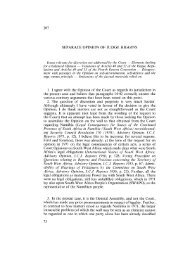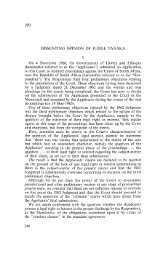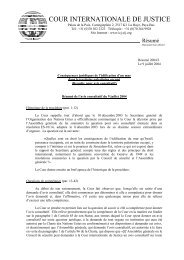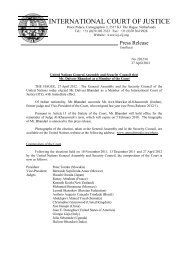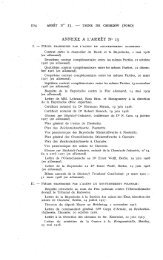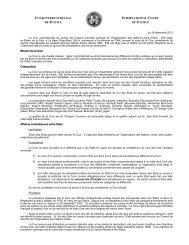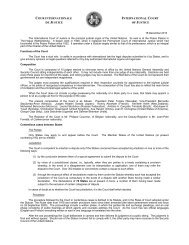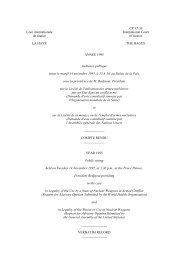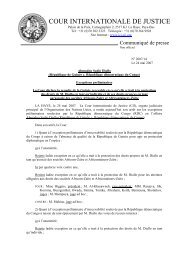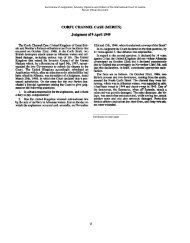botswana/namibia - Cour international de Justice
botswana/namibia - Cour international de Justice
botswana/namibia - Cour international de Justice
You also want an ePaper? Increase the reach of your titles
YUMPU automatically turns print PDFs into web optimized ePapers that Google loves.
(b) as regards notification when this not effected at the time State authority was established. In these situations<br />
the jurispru<strong>de</strong>nce recognises acquisitive prescription, on the condition that there should have been silence on the<br />
part of the sovereign, on the one hand, and, on the other hand, the effective exercise, continuous and<br />
uninterrupted, of territorial sovereignty (peaceful possession). The requirement of these two conditions stems<br />
from the Award given on 23 October 1909 by the Permanent <strong>Cour</strong>t of Arbitration in the case of the Maritime<br />
Boundaries between Swe<strong>de</strong>n and Norway, or the Grisbadarna case; from the Arbitral Award given on 15 June<br />
1911 between the United States and Mexio in the Chamizal case (A.J.I.L., 1911, in particular pp.805-807); and<br />
from the Arbitral Award given on 4 April 1928 by Professor Max Huber in the Island of of Palmas case (R.S.A.,<br />
Vol. II, pp.850 and 868 and R.G.D.I.P., 1935, pp.176 in fine, 177 and 198 in fine, 199..."]<br />
650. Another standard French authority, Nguyen Quoc Dinh, Daillier and Pellet, <strong>de</strong>scribes the<br />
legal position thus:<br />
"3_ La prescription acquisitive ou usucapion permet l'acquisition d'un territoire étranger par<br />
un État qui y exerce son autorité <strong>de</strong> manière continue et pacifique pendant une longue<br />
pério<strong>de</strong>. L'État qui possédait ce territoire est présumé, du fait <strong>de</strong> sa passivité face à l'atteinte à<br />
sa souveraineté, avoir renoncé à ses droits. Par l'usucapion, la possession acquise <strong>de</strong> bonne foi<br />
se transforme en droit <strong>de</strong> souveraineté.<br />
Il est souvent contesté que la prescription acquisitive soit reçue en droit <strong>international</strong> positif,<br />
tant l'institution est attentatoire à la souveraineté territoriale et contraire au principe du<br />
consensualisme. Il reste qu'elle correspond également à certaines réalités historiques,<br />
marquées par un développement progressif <strong>de</strong> la souveraineté et culminant dans la possession<br />
territoriale incontestée. Elle s'est révélée utile surtout pour <strong>de</strong>s possessions territoriales<br />
éloignées et à <strong>de</strong>s époques où la <strong>de</strong>nsité <strong>de</strong>s actes <strong>de</strong> puissance publique était moindre<br />
qu'aujourd'hui: l'arbitre Max Huber y fait allusion dans l'affaire <strong>de</strong> l'ile <strong>de</strong> Palmas (R.S.A.<br />
vol.II, p.843) et la C.I.J. dans l'affaire du Droit <strong>de</strong> passage en territoire indien (Rec. 1960,<br />
p.39).2<br />
[2 Translation:<br />
"3. Acquisitive prescription or usucapion allows the acquisition of foreign territory by a State which exercises its<br />
authority over it continuously and peacefully over a long period. The State which possessed the territory is<br />
presumed, by the fact of its passivity in face of the threat to its sovereignty, to have renounced its rights. By<br />
means of usucapion, the possession acquired in good faith is transformed into sovereignty.<br />
It is often disputed that acquisitive prescription should be accepted as part of positive <strong>international</strong> law, in as<br />
much as the institution poses a threat to territorial sovereignty and is contrary to the principle of consensualism.<br />
The fact remains that it corresponds to certain historical realities, characterised by a progressive <strong>de</strong>velopment of<br />
sovereignty and culminating in an undisputed territorial possession. It has been shown to be useful particularly<br />
for remote territorial possessions and for epochs in which the <strong>de</strong>nsity of acts of State authority was less than is<br />
the case today: the Arbitrator Max Huber referred to it in the Island of Palmas case (R.S.A. vol. II, p.843) and the<br />
I.C.J. in the Right of Passage case (Rec. 1960, p.39).]<br />
651. The Government of Botswana <strong>de</strong>nies the existence of any Namibian title on the basis of<br />
prescription and its associated principles. In<strong>de</strong>ed, as will be <strong>de</strong>monstrated, there is ipso jure<br />
and ab initio no room for the application of the doctrine of prescription. However, it is<br />
necessary to indicate the essential elements of prescription for the purposes of <strong>de</strong>veloping the<br />
argument. They are as follows:<br />
(i) The continuous and public exercise of State authority over the area concerned for a<br />
sufficient period of time.



